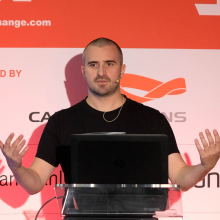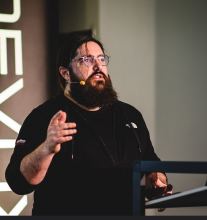Summary
Disclaimer: This summary has been generated by AI. It is experimental, and feedback is welcomed. Please reach out to info@qconlondon.com with any comments or concerns.
The presentation titled "Questioning Convention: C# as a Shortcut to Startup Velocity" was delivered by Sam Cox, CTO and Co-founder of Tracebit. The presentation discusses the strategic choice of using C# for startup development at Tracebit and outlines the benefits and experiences encountered in this decision.
Key Themes and Insights:
- Startup Challenges: Initiating a startup involves competing with well-established companies with limited resources, necessitating a high level of productivity defined by focusing on activities that truly matter. Sam Cox shares his journey as a solo engineer navigating these challenges.
- Adoption of C#: In a field dominated by languages like Golang, TypeScript, and Python, Tracebit took a contrarian route by choosing C#. This was largely due to C#'s robust ecosystem, performance optimization, and familiarity with modern coding constructs.
- Advantages of C#: The decision to use C# was based on productivity gains through its rich suite of tools and features, which enabled rapid prototyping, feedback loops, and iteration. With C#, Sam was able to quickly build out essential components of their platform, allowing for real-time feedback and adjustments.
- Unique Approach: Sam employed a modular monolith strategy, allowing smooth orchestration of services within the application. This included using generic hosts and service orchestration to manage functionalities with minimal overhead.
- Infrastructure and Performance: The ability to easily iterate and adapt infrastructure configurations without extensive rewrite, as well as the use of batching and concurrency controls to address performance concerns, were key operational benefits.
- Growth and Impact: By leveraging C#, Tracebit grew from a solo-engineer startup to a team-oriented company, securing enterprise customers and funding. The talk emphasizes how strategic technology choices can strengthen startup velocity and product-market fit.
The presentation also included practical coding examples and Sam's reflections on the broader implications of choosing a less conventional programming language for startups, encouraging other entrepreneurs to consider varied technology stacks amidst industry norms.
This is the end of the AI-generated content.
Abstract
Are you considering founding a startup? What stack would you use? Would you take a bet on a programming language you've never used professionally before? When building a company from scratch, these aren’t just theoretical questions – they’re make-or-break decisions with real consequences.
In a situation where conventional wisdom might point to Golang, TypeScript or Python; Tracebit took a different - and potentially surprising - path by building in C#.
Sam, the CTO & Co-founder of Tracebit, will explore the rationale behind this decision and why it’s been pivotal in enabling a small team to punch above their weight to win discerning enterprise customers in a competitive cybersecurity market. He’ll tell the zero-to-one story of solo-engineering an MVP, landing our first enterprise customer, and growing a high-performing team through practical, in-the-trenches examples of how C# allows you to do more with less while scale increases and runway decreases.
Whether you're launching a new venture or an engineering leader weighing technical tradeoffs, this session offers actionable insights for making technology decisions that serve both immediate needs and long-term vision – and how questioning the consensus about programming languages might be the strategic advantage you've been overlooking.
Speaker

Sam Cox
Co-Founder & CTO @Tracebit, Building Security Canaries at Scale
Sam is the CTO & Co-founder of Tracebit where he’s building and scaling systems to automate the use of cloud-native infrastructure as Security Canaries to detect intrusions and insider risk in cloud environments.
Sam has spent over a decade designing and building critical software systems at scale, previously at Tessian where he architected resilient systems to handle high-volume email traffic for some of the world’s largest enterprises using a shuffle-sharded, cell-based design.
Sam has previously presented cloud security research at fwd:cloudsec, revealing a now-patched technique to uncover the AWS account ID of private S3 buckets.






